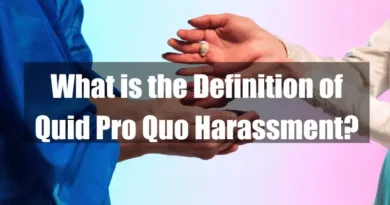I. Introduction
Quid pro quo harassment can have a devastating emotional impact on victims. Victims may feel humiliated, degraded, and violated. They may also experience fear, anxiety, and depression. Quid pro quo harassment can also lead to post-traumatic stress disorder (PTSD).
Here are some of the specific emotional effects of quid pro quo harassment:
II. Emotional Effects of Quid Pro Quo Harassment
1. Shame and Guilt

Victims of quid pro quo harassment may feel shame and guilt for what happened, even though it was not their fault. They may feel like they somehow deserved the harassment or that they did something to provoke it.
For example, a victim of quid pro quo harassment may feel ashamed if they were forced to engage in sexual activity to keep their job. They may also feel guilty if they did not report the harassment to their employer or feel like they should have done more to stop it.
2. Fear and Anxiety
Victims of quid pro quo harassment may be afraid of their harasser and what they might do if they don’t comply with their demands. They may also be anxious about their job security and the potential consequences of reporting the harassment.
For example, a victim of quid pro quo harassment may be afraid that their harasser will fire them if they don’t comply with their demands. They may also be anxious about reporting the harassment to their employer, fearing they will not believe or retaliate against them.
- Also, read How to Prove Quid Pro Quo Harassment: 13 Powerful Evidences.
- Also, read Quid Pro Quo Harassment vs. Hostile Work Environment Harassment.
3. Depression and Helplessness
Victims of quid pro quo harassment may feel depressed and helpless. They may lose interest in activities they used to enjoy and withdraw from social interaction. They may also feel like they can do nothing to stop the harassment.
For example, a victim of quid pro quo harassment may become depressed and withdrawn after being harassed by their boss. They may lose interest in their job and hobbies and start to avoid spending time with friends and family. They may also feel like there is nothing they can do to stop the harassment for fear of losing their job or being retaliated against.
4. Anger and Resentment
Victims of quid pro quo harassment may also feel resentful towards their harasser and their employer. They may feel like they have been taken advantage of and that their rights have been violated. They may also feel like they are not being treated fairly and punished for not complying with the harasser’s demands.
For example, a victim of quid pro quo harassment may feel angry at their harasser for taking advantage of them. They may also feel angry at their employer for not doing more to prevent the harassment from happening. They may also feel angry at themselves for being unable to stop the harassment or for not reporting it sooner.
5. Post-traumatic Stress Disorder (PTSD)

In some cases, victims of quid pro quo harassment may develop PTSD. This is a serious mental health condition that can cause a range of symptoms, including flashbacks, nightmares, and difficulty sleeping.
For example, a victim of quid pro quo harassment may experience flashbacks of the harassment, even months or years after it happened. They may also have nightmares about the harassment, or they may have difficulty sleeping because they are afraid of having nightmares. They may also avoid situations that remind them of the harassment, such as going to work or being around their harasser.
6. Self-doubt and Insecurity
Victims of quid pro quo harassment may start to doubt their abilities and question their worth. They may feel insecure about their appearance and their performance at work.
For example, a victim of quid pro quo harassment may start to doubt their ability to do their job well if their boss is constantly harassing them. They may also feel insecure about their appearance if their harasser makes unwanted sexual advances or comments.
- Also, read Quid Pro Quo History Examples: A Complex Dance of Mutual Exchange.
- Also, read Explaining Quid Pro Quo Harassment Under Title IX.
7. Isolation and Loneliness
Victims of quid pro quo harassment may feel isolated and alone. They may be afraid to tell anyone what is happening for fear of being judged or retaliated against.
For example, a victim of quid pro quo harassment may feel isolated from their coworkers if their boss is harassing them. They may also feel isolated from their friends and family if they are afraid to tell them what is happening.
8. Sexual Dysfunction
Quid pro quo harassment can lead to sexual dysfunction in both men and women. Victims may experience problems with arousal, orgasm, and desire.
For example, a victim of quid pro quo harassment may experience sexual dysfunction if they were forced to engage in sexual activity with their harasser. They may also experience sexual dysfunction if they are constantly being harassed or threatened with harassment.
9. Substance Abuse

Victims of quid pro quo harassment may turn to alcohol or drugs to cope with the emotional pain. This can lead to addiction and other problems.
For example, a victim of quid pro quo harassment may start drinking heavily or using drugs to cope with the stress and anxiety of the harassment. This can lead to addiction and other problems, such as job loss, relationship problems, and legal trouble.
- Also, read The 13 Legal Implications of Quid Pro Quo Harassment.
- Also, read How to Prevent Quid Pro Quo Harassment: 20 Effective Ways.
10 Humiliation and Degradation
Victims of quid pro quo harassment may feel humiliated and degraded. They may feel like they have been objectified and reduced to a sexual object.
For example, a victim of quid pro quo harassment may feel humiliated if their harasser makes unwanted sexual advances or comments. They may also feel humiliated if they are forced to engage in sexual activity to keep their job.
11. Betrayal and Betrayal of Trust
Victims of quid pro quo harassment may feel betrayed by their harasser and employer. They may feel like their trust has been violated.
For example, a victim of quid pro quo harassment may feel betrayed by their boss if they were forced to engage in sexual activity to keep their job. They may also feel betrayed by their employer if they do not do more to prevent the harassment from happening.
12. Loss of Control
Victims of quid pro quo harassment may feel like they have lost control of their lives. They may feel at the mercy of their harasser and their employer.
For example, a victim of quid pro quo harassment may feel like they have lost control of their career if they are forced to quit their job because of the harassment. They may also feel like they have lost control of their personal life if they are afraid to go to work or be around other people.
- Also, read 20 Ways to Prevent Quid Pro Quo Harassment Under Title IX.
- Also, read Workplace Quid Pro Quo Harassment: An Ultimate Guide.
13. Powerlessness
Victims of quid pro quo harassment may feel powerless. They may feel they have no options and can do nothing to stop the harassment.
For example, a victim of quid pro quo harassment may feel powerless if they are afraid of losing their job if they report the harassment. They may also feel powerless if they feel like their employer will not believe them or that they will not take action to stop the harassment.
10 Hazardous Personal Effects of Quid Pro Quo Harassment
14. Violation of Privacy

Victims of quid pro quo harassment may feel like their privacy has been violated. Their harasser may have made unwanted sexual advances or comments, or they may have been pressured to engage in sexual activity.
For example, a victim of quid pro quo harassment may feel like their privacy has been violated if their harasser sends them unwanted sexual text messages or emails. They may also feel like their privacy has been violated if they are forced to engage in sexual activity with their harasser to keep their job.
15. Loss of Dignity
Victims of quid pro quo harassment may feel like they have lost their dignity. They may feel like they are no longer worthy of respect.
For example, a victim of quid pro quo harassment may feel like they have lost their dignity if their harasser makes derogatory comments about their appearance or their sexual performance. They may also feel like they have lost their dignity if they are forced to engage in sexual activity with their harasser to keep their job.
- Also, read How to Create an Anti-Harassment Policy: 9 Effective Steps.
- Also, read How to Create an Effective Anti-Harassment Policy Under Title IX.
16. Self-blame
Victims of quid pro quo harassment may blame themselves for what happened. They may think that they did something to provoke the harassment.
For example, a victim of quid pro quo harassment may blame themselves if they were forced to engage in sexual activity with their harasser to keep their job. They may think that they should have done more to stop the harassment or not have been so naive.
17. Dissociation
Dissociation is a feeling of being detached from reality. It is a coping mechanism that some people use to deal with trauma. Victims of quid pro quo harassment may experience dissociation, especially if the harassment is severe or prolonged.
For example, a victim of quid pro quo harassment may experience dissociation if they were forced to engage in sexual activity with their harasser. They may feel like they are not present in their own body or are watching what is happening to them from a distance.
18. Suicidal Thoughts
In some cases, victims of quid pro quo harassment may have suicidal thoughts. This is because the emotional pain of the harassment can be overwhelming.
For example, a victim of quid pro quo harassment may have suicidal thoughts if they feel like they have no way to escape the harassment. They may also have suicidal thoughts if they feel like they have lost their dignity or their self-worth.
- Also, read Explaining Non-Sexual Quid Pro Quo Harassment.
- Also, read Educational Quid Pro Quo Harassment: An Ultimate Guide.
19. Confusion and Disorientation

Victims of quid pro quo harassment may feel confused and disoriented about what happened. They may question their reality and judgment.
For example, a victim of quid pro quo harassment may feel confused about why their harasser targeted them and why they didn’t do more to stop the harassment.
20. Self-hatred
Victims of quid pro quo harassment may develop self-hatred. They may feel dirty, damaged, or unworthy of love.
For example, a victim of quid pro quo harassment may develop self-hatred if their harasser makes derogatory comments about their appearance or their sexual performance. They may also develop self-hatred if they feel they are to blame for what happened.
21. Difficulty Trusting Others
Victims of quid pro quo harassment may have difficulty trusting others, especially people in authority positions. This is because their harasser betrayed them, and they may fear others will also betray them.
For example, a victim of quid pro quo harassment may have difficulty trusting their boss, even if their boss is supportive and understanding. They may also have difficulty trusting their friends and family, fearing they will not believe or judge them.
22. Relationship Problems
Quid pro quo harassment can damage relationships with partners, family, and friends. Victims of harassment may withdraw from social interaction and become isolated. They may also have difficulty connecting with others emotionally.
For example, a victim of quid pro quo harassment may withdraw from their partner and become less affectionate. They may also avoid spending time with their friends and family, fearing they will not understand what they are going through.
- Also, read Explaining Government Quid Pro Quo Harassment.
23. Difficulty Concentrating at Work or School
Victims of quid pro quo harassment may have difficulty concentrating at work or school. They may be distracted by thoughts of the harassment or the fear of it happening again.
For example, a victim of quid pro quo harassment may have difficulty concentrating on their work if their boss is constantly harassing them. They may also have difficulty concentrating on their schoolwork if they are afraid of seeing their harasser or worried about the consequences of reporting the harassment.
“It is important to note that these are just some of the emotional effects of quid pro quo harassment. Every person experiences harassment differently, and the emotional effects can vary depending on the individual’s unique circumstances.”
“If you or someone you know has been the victim of quid pro quo harassment, please reach out for help. There are many resources available to support victims of harassment. Please know that you are not alone.”
13 Powerful Resources for Victims of Quid Pro Quo Harassment
III. How can you cope with the emotional effects of quid pro quo harassment?

After that, we understand that the emotional effects of quid pro quo harassment can be severe and long-lasting. Here are 15 ways to cope with these effects:
- Reframe your narrative. Instead of seeing yourself as a victim, see yourself as a survivor. This shift in perspective can empower you and give you a sense of control over your life.
- Challenge your negative thoughts. When you find yourself having negative thoughts about yourself or the harassment, challenge them. Ask yourself if there is any evidence to support these thoughts. If not, replace them with more positive and realistic thoughts.
- Practice self-compassion. Be kind and understanding to yourself during this difficult time. Forgive yourself for any mistakes you may have made, and remind yourself that you deserve love and support.
- Express yourself creatively. Writing, painting, music, and other forms of creative expression can help you process your emotions and heal from trauma.
- Connect with nature. Spending time in nature has been shown to have several psychological benefits, including reducing stress and anxiety. Find a natural place where you feel at peace and spend some time regularly.
- Practice mindfulness. Mindfulness is the art of savoring the present moment without judgment. It can help manage difficult emotions and reduce stress. Meditation, yoga, and simply sitting quietly to focus on your breath are all ways to practice mindfulness.
- Get regular exercise. Exercise is a balm for stress, a mood booster, and an elixir for self-esteem. To see the advantages, try to get in at least 30 minutes of moderate-intensity activity most days.
- Eat a healthy diet. Eating a healthy diet is like nourishing your soul with sunshine. It nurtures your overall mood and well-being. Make sure to eat plenty of fruits, vegetables, and whole grains. Avoid processed foods, sugary drinks, and excessive caffeine and alcohol.
- Get enough sleep. When well-rested, you’re better able to cope with stress and difficult emotions. Aim for 7-8 hours of sleep each night.
- Avoid alcohol and drugs. Alcohol and drugs can interfere with sleep, worsen mood, and make it more difficult to cope with stress. If you’re struggling to cope with the emotional effects of quid pro quo harassment, avoid using alcohol or drugs.
- Seek professional help. If you’re struggling to cope with the emotional effects of quid pro quo harassment on your own, please seek professional help from a therapist or counselor. They can provide you with support and guidance as you heal.
- Connect with other survivors. Talking to other people who have been through similar experiences can help you feel less alone and learn new coping mechanisms. Many online and in-person support groups are available for survivors of quid pro quo harassment.
- Advocate for yourself and others. Once you’ve healed from your experience of quid pro quo harassment, you may want to consider advocating for yourself and others who have been harassed. You can do this by sharing your story, educating others about quid pro quo harassment, and working to change policies and procedures that make it easier for harassers to get away with their behavior.
- Engage in activities that bring you joy. Schedule time for the things that make you happy and feel alive. This could include spending time with loved ones, pursuing hobbies, or simply relaxing and doing nothing.
- Be patient. Healing from the emotional effects of quid pro quo harassment takes time. Treat yourself with kindness and permit yourself to recover at your own pace. Remember, healing is not a race; it is a journey.
IV. Citations
- Howard, L. G. (2008, August 21). The Sexual Harassment Handbook. Readhowyouwant.
- Paludi, M. A., & Barickman, R. B. (1991, January 1). Academic and Workplace Sexual Harassment. State University of New York Press.
- Robertiello, G. (2021, August 9). Sexual Harassment and Misconduct. Bloomsbury Publishing USA.









